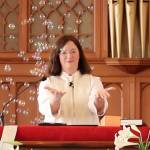Cloudy vision
The inscrutable, unpredictable call of God
By Sue Washburn

We can see the direction God’s cloud is leading, but we can’t always see the final destination.
I’m rarely accused of having my head in the clouds. I’m not the daydreaming, stare off into space sort. I feel most comfortable when I know what to expect in my day.
I use my phone’s calendar app keep me on track. I get twitchy just thinking about leaving the house without knowing what my day will bring. When my calendar app pops up a reminder on my phone, tablet or computer, I do it. I keep my calendar in the cloud so I can access it anywhere.
The online cloud is great. I can use it for scheduling and directions and to look up Bible passages and send notes and pictures to friends. It’s great because I get to control it.
In the Bible, I notice that God uses a cloud to get work done, too, especially in the Old Testament. Of course God’s cloud is a literal cloud that people can see. In the Exodus story God uses the cloud to make calls, hold meetings and even give directions to Israelites as they wandered through the desert.
Seeking to be faithful, I pay attention to the God cloud as well. But it feels vague and unpredictable. God’s cloud is inscrutable because I don’t know the mind of God. God’s cloud is unpredictable because I don’t understand God’s calendar. The messages I get from God can seem random.
Have you ever noticed God’s calls are never on schedule? They rarely come when I’m in the office or the pulpit. In fact for me it’s usually 3 a.m. Or on the treadmill. Or at a time when I’m enjoying a little bit of anger or self-righteousness, I’ll hear God’s ringtone and know that something needs to change.
Of course, I don’t literally hear God’s ringtone. We don’t often get the direct communication anymore. But I get a feeling or an insight that God has called a meeting. That God is changing direction and I’d better pay attention.
While cloud communication has changed between the time the Israelites wandered the desert and today, the nature of God doesn’t change. God is still speaking to us, calling meetings and giving us direction. Following God means we are faithful to a moving target. I notice that God’s name contains the word Go.
The challenge is that our vision of God’s cloud can be, well, cloudy.
Depending on which version of the Exodus story you read, God’s cloud may be communicating something or obscuring something. For most of us, it does both. God’s cloud calls us forward, but it doesn’t let us look too far ahead.
Or as Paul says we see through a glass darkly.
Clearing up cloudy vision
Having cloudy vision is a good thing when it comes to faith.
- Cloudy vision looks to God inspiration.
- Cloudy vision follows God’s direction, without knowing the details.
- Cloudy vision trusts that God will provide.
- Cloudy vision heeds God’s call to dismantle and rebuild, time and time again.
When God’s cloud moved, the Israelites had to move the Tabernacle they built (to God’s specifications). That means they had to fold up 42-foot linen curtains and give them to someone to carry. They slid poles through the rings on the Ark of the Covenant and hoisted it onto shoulders. They carried tables and gold lamp stands and all the other heavy things that made up their place of worship.
They moved to a new place because God’s cloud moved. Sometimes they’d stay for days. Sometimes for months. Sometimes for a year. Their faith life was one of constantly dismantling and rebuilding. And in many ways, so is ours.
There are great debates about how much dismantling and rebuilding our congregations are called do as God’s cloud moves and our culture changes. And it’s hard.
I recently talked to a colleague who said I should expect to see some of the congregants from the church she serves. The two small churches have a history of member swapping when people decide they don’t like certain issues or pastors.
“Why?” I asked. They’d already left the denomination and we hadn’t seen any new faces. I was curious about what could be going on that she would tell me to expect to see new people.
“We’re doing a church revitalization project,” she said. “We’re rethinking the sanctuary and getting rid of the pews.”
“So why would people come to the church I serve? That sounds like a great idea.”
“They are mad because we’re getting rid of the pews. They’ll come to you because you have pews.”
God’s cloud is moving in our small town. But our cloudy vision makes it difficult to see the big picture. God’s call to one congregation isn’t God’s call to all of them. God’s cloud is vast and complex.
So we do our best to discern the way God’s people always have. What do we dismantle? What do we rebuild? And how do we remain faithful in the process?
 Rev. Sue Washburn the bi-vocational pastor of Reunion Presbyterian Church in Mount Pleasant, Pennsylvania and a freelance writer.
Rev. Sue Washburn the bi-vocational pastor of Reunion Presbyterian Church in Mount Pleasant, Pennsylvania and a freelance writer.